Ministry of Labour & Employment
Two-day Labour 20 Summit concludes in Patna
The conference resolves to develop multilateral mechanism among the G20 member states and other invited countries on the portability of social security benefits
Posted On:
23 JUN 2023 8:04PM by PIB Delhi
The Labour20 Summit held in Patna from June 21–23, 2023, resolved for a multilateral mechanism among G20 member states and other associated countries on the portability of social security benefits. Addressing the press conference after the conclusion of the two-day Summit L-20 President and All India President of the Indian Labour Union Shri Hiranmay Pandya said the summit noted that at present most of the countries allow portability under bilateral agreements between sending and receiving countries while discussing in detail the task force report on ‘International Migration of labour - International Portability of social security funds.'
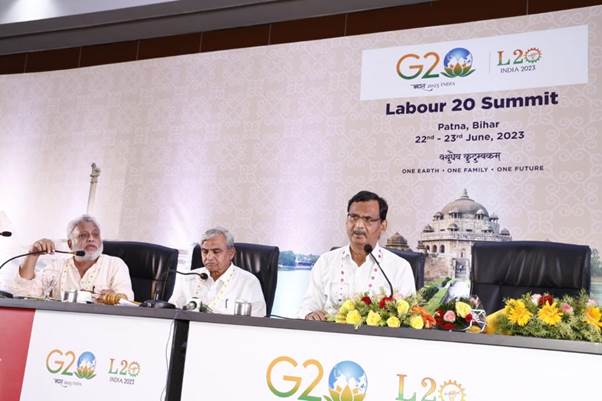
The inception meeting of Labour20 held in Amritsar on 18, 19 and 20 March 2023 had formed 5 task forces related to burning issues in the world of work namely – 1- Universal Social Security, 2- Women And Future Of Work, 3- International Migration of labour - International Portability of social security funds, 4- Changing World of Work: New Employment opportunities and Challenges in G20 Countries, and 5- Skill Development: Role and responsibilities of stakeholders.
The task force on ‘International Portability of social security funds’ recommended that data on the susceptibilities and needs of migrants should be collected and analysed for the efficiency of social protection systems. Disaggregation of national data pertaining to social safety schemes, considering citizenship and residency status as reliable indicators of migrant status. This would facilitate the computation of the potential financial ramifications of transferable benefits and the estimation of the labour migrants' effective or de facto social protection coverage. Private and social partnerships should be considered to implement the portability of funds through third-party service providers.
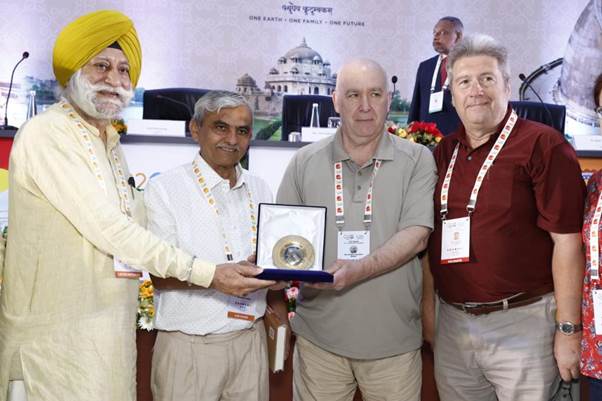
The summit proposed post extensive deliberations a multilateral agreement among important migrant-receiving and migrant-sending countries guaranteeing totalisation as well as exportability thereby providing benefits to migrant workers. However, concerns were expressed about delays due to negotiations in the manifestation of the agreements. In a fast-moving world, the world of work is facing unforeseen and significant changes. This also brings new employment opportunities and new avenues of livelihoods. In the current digital era when new forms of employment opportunities are emerging, it brings mixed impacts on workers.
The task force report on ‘Changing World of Work: New Employment Opportunities and Challenges in G20 Countries’ proposed a roadmap to address the issues. The task force recommended that the care economy holds significant job potential, and regulations should be in place to protect workers. Skill development is crucial to leverage emerging opportunities. Trade unions must prioritize the issues faced by workers engaged in new forms of work. Labour market policies need to be designed for promoting re-entry into employment, and the legal obstacles hindering re-entering in employment should be removed.
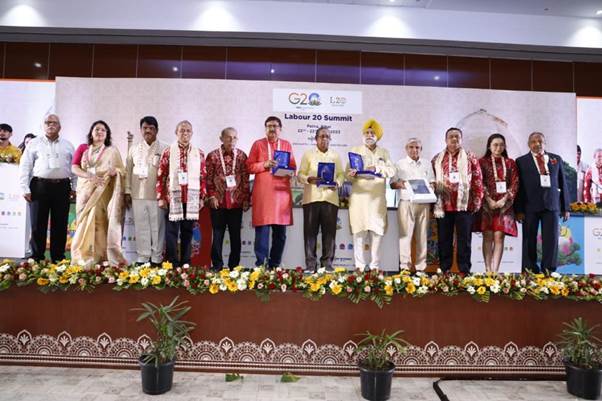
The summit observed that the concept of the Purple Economy explores the potential impact on job creation, emphasizing the significance of both direct and indirect care work. To ensure the well-being of workers, the state needs to encourage actions that support care activities and establish clear regulations for worker protection within the care economy. Additionally, skill development programs should be prioritized to enable individuals to harness emerging opportunities in this sector.
The widespread use of artificial intelligence (AI) has been extensively discussed, highlighting its positive impacts such as increased labour productivity, income growth, and improved living standards. However, it is crucial to address the negative consequences that arise from the asymmetrical effects of AI, which can lead to socio-economic and power inequalities. Harmonizing technological innovation with sustainable and just transitions is a DRAFT No. 1 L20, Patna key aspect that needs to be thoroughly examined and integrated into policy frameworks. Technology and globalization share an intimate relationship, with advancements in technology often driving and shaping globalization processes. Governments play a crucial role in providing social protection and basic social services to mitigate the potential adverse effects of technological advancements and globalization on workers. Trade unions and worker associations should actively engage with and prioritize the concerns of workers engaged in emerging forms of work, ensuring their rights and well-being are protected. Collaboration and exchange of best practices can help create a fair and equitable environment for workers in the global economy. It is also essential to implement a social security code that covers all workers, including gig and platform workers, complemented by specific laws tailored to their unique needs.
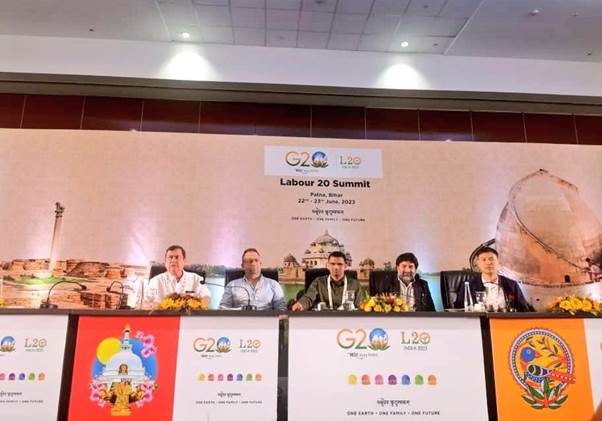
The establishment of a tripartite board, consisting of representatives from the government, aggregator companies, and trade unions, can facilitate effective decision-making and policy formulation. This collaborative approach ensures that the perspectives and interests of all stakeholders are considered, fostering a more balanced and inclusive work environment. Moreover, at each transition, a levy or contribution to a social security board should be implemented, providing beneficiaries with access to specific services that cater to their individual requirements and circumstances.
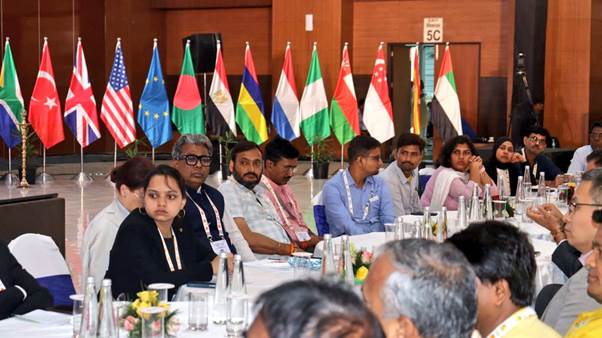
The summit noted that women are always the worst affected by any crisis emerging. This was apparent during the COVID pandemic crisis. Women find it most difficult to adjust to the changing world of work. The summit discussed in detail the task force report on ‘Women And Future Of Work’. The task force proposed to increase the participation of women in the private sector and promote their leadership roles, it is crucial to provide incentives and create a supportive environment. This can be achieved by implementing measures such as offering remote working arrangements and flexible working hours, enabling women to balance their personal and professional responsibilities effectively. Additionally, subsidized childcare facilities are essential to ensure the sustainability of women in jobs, as it eases the burden of childcare responsibilities. Gender sensitization programs for management can also play a vital role in fostering an inclusive and respectful work environment. Furthermore, women can explore promising opportunities in emerging sectors like gig and platform work, as well as in areas such as caregiving, pet care, and education. Encouraging women's entrepreneurship and providing skill-building opportunities are also key factors. Offering mentors, increased funding options, and other forms of support can empower women entrepreneurs. Additionally, expanding free networking platforms for women in the workforce and leveraging social media to showcase their skills and establish a strong online presence can further enhance their visibility and career prospects. Through these comprehensive initiatives, we can create a more diverse and inclusive private sector with increased representation and leadership of women.
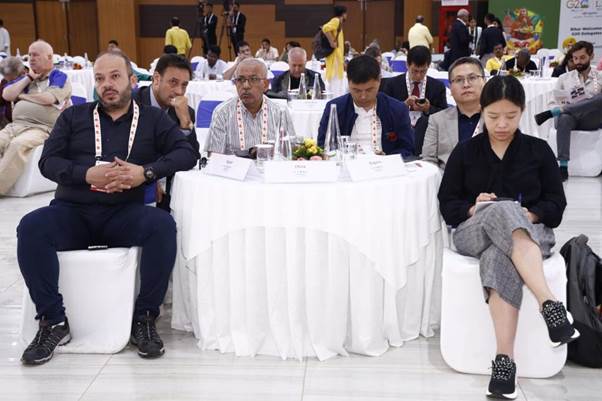
The summit identified three important issues related to the implementation of social security, they are universalisation, financing and portability. Financing of social security funds needs to be expanded by budget allocations which many governments are shying away from. Many times, the policy-making process confuses the terms social security, social insurance, social assistance and social protection. Governments need to move from social protection and social assistance towards social security and social insurance. It unanimously expressed its commitment towards universalisation of social security during the deliberations on the task force report on ‘Universal Social Security’. Wages and social security are two important constituents of decent work. Implementing social security up to the last person is a critical challenge in the world of work. All the tripartite constituent’s wiz. Workers, employers and governments have to endeavour unitedly to achieve the last-mile DRAFT No. 1 L20, Patna connectivity of social security benefits and policies.
The task force recommended that the global workforce faces significant challenges in accessing social security, with 61% of workers in the informal sector lacking such coverage. To address this issue, it is crucial to envision a third model of social security that combines elements from both contributory and noncontributory systems. Social insurance should become a priority for the G20 countries. Barriers to social security include exclusion due to legal frameworks, lack of awareness among workers and engagement in unregistered micro, small, and medium enterprises (MSMEs) due to high operational costs. Within the fiscal space, measures such as increasing contributory and tax revenues, eliminating illicit financial flows, reallocating public expenditure, managing sovereign debt, and adopting a more accommodative macroeconomic framework can be implemented. The growing influence of AI, technology, and digitization in the workforce has further marginalized workers, emphasizing the need for a human-centric approach to social security. Involving society through methods like donated pensions can also enhance social security coverage.
The terms formality and informality must be redefined and tailored to specific regions and countries. Addressing low wages is crucial as it directly affects the amount of contributions and budget resources allocated to social security. Increasing wages and improving job quality through direct investments or measures to stimulate employers are essential components of reducing workers' dependence on social benefits. Social insurance and welfare systems should strive to protect all groups of workers, ensuring no one is left without coverage. Identifying and eliminating loopholes in legislation, contracts, and insurance practices is necessary through a system of tripartism and social partnership. The changing forms of work demand new skills and skill upgradation. The workers should be able to easily access training and skill development.
The task force report ‘Skill Development: Role and Responsibilities of Stakeholders’ enumerated ways of addressing the skill gap. The summit also took note of the deliberations that have taken place in the employment working group attempts for employment generation. The task force recommended that skill training curricula should incorporate green skills to address the global skill gap. To ensure that skills acquired in one country are recognized in another, there is a need for a common qualification framework. This framework would ensure that skills obtained in the source country are acknowledged and valued in the destination country. Additionally, it is proposed that a global skill management information system (MIS) should be developed. Instead of solely focusing on workers without skill certificates, there should be a greater emphasis on recognizing prior learning (RPL).
The summit was attended by trade union leaders as well as experts on labour from 28 countries, along with representatives from Indian trade unions, participated in the deliberations. The summit also discussed labour-related issues that have emerged in the meetings of Civil20, Women20, Youth20 and Science20. The summit discussed the feasibility of a joint statement between Labour20 and Business20 in the presence of representatives from Business20. The summit decided to convey the concerns expressed by the participants to the ensuing labour and employment minister’s meeting (LeMM) as well as the G20 leaders’ summit to be held in September.
******
MJPS
(Release ID: 1934873)
Visitor Counter : 4385